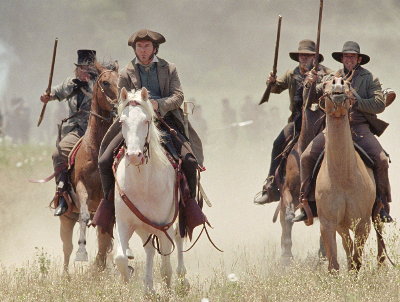|
Movie Review: 'The Alamo'
by Rich Brooks
17 April 2004
A few days ago VNN published a front-page "spintro" item that positively gloated over the opening week box-office failure the latest celluloid incarnation of "The Alamo." It was alleged that this latest production of jew Eisner's Buena Vista/Touchstone (a division of ABC/Disney) treated White audiences and White heroes with cynical disrespect and misrepresented history in an anti-White and semitically-correct manner. Out of curiosity, I decided to go see this movie anyway, fully expecting to write a review equally as sneering as VNN's short synopsis.
I have to believe that the editor who wrote the disparaging remarks never saw the movie, because I came away from the theater with an entirely different opinion. I actually liked the film's portrayal of the Alamo's defenders as courageous freedom fighters willing to die in a hopeless fight rather than surrender to the viciously cruel and swarthy Mexican "Napoleon," Santa Anna. While this "Alamo" is not as unabashedly jingoistic as John Wayne's 1960 version, historical figures Sam Houston, Jim Bowie, William Travis, and especially Davy Crockett are treated as true heroes by director John Lee Hancock. In fact, as I was watching this drama unfold, I actually felt a few tinges of patriotic emotion well up in me at times, even though I have never lived in Texas and have a general distaste for that state. While these Alamo defenders are portrayed as three-dimensional characters, many of whom have come to Texas to start life anew, there is never any doubt about either their bravery or the justness of their cause. They are flawed individuals with strong and contentious personalities, but are united in their love for home and freedom.
The most three-dimensional of these characters is Billy Bob Thornton's Davy Crockett. This renowned frontiersman was a legend in his own day, but here in this movie he prefers to be called "David Crockett" and to debunk much of the mythology even then associated with his name. The coonskin hat, he maintains, was just something in the imagination of a playwright, and Crockett's real persona is that of a respected U.S. Congressman. He is still one sharp marksman, however, and exhibits the bravery if not the bravado of his legend. Thornton literally steals the show, and I have no doubt that his Davy Crockett portrayal is much more historically accurate than Fess Parker's. Crockett does in fact die on his knees in this film, but he does so defying Santa Anna and calling for the Mexicans to surrender!

Jim Bowie, sick with typhus during most of the film, nevertheless takes two Mexicans with him from his deathbed. Jason Patric gives this part a complex but sympathetic reading. Even more interesting, however, is the character of acting commander at the Alamo, Lt. Col William Travis, played by Patrick Wilson. Travis starts out the film as somewhat of a prick. This cocky officer has selfishly abandoned his wife and because of an abrasive personality receives no support from the troops under his command, either regular army or militia. As events unfold, however, he commits an act of bravery (defusing by hand a live cannon ball) and gradually earns the respect of his men. Less successful is Dennis Quaid's Sam Houston. Houston, who should be the biggest hero of the Texas Independence saga, is overshadowed in this film by the other characters. Finally, Emilio Echevarria gives us deliciously villainous performance as Santa Anna.
While our heroes are mostly all White men, we do see a number of blacks (slaves) and mestizos (tejanos) living with the "Texians" at the mission/fort compound. Many of these non-Whites leave the Alamo when offered safe passage by Santa Anna, but others remain faithful to the death to their White masters/benefactors. I'm not sure how historically accurate this movie's racial depictions are, but I didn't get the feeling we were having niggers and spics shoved down our throats as is so often the case in Hymiewood.
This movie doesn't end with the death of the Alamo defenders, as perhaps it should. After the dramatic death of Crockett, I expected to see an epilogue caption saying how "Remember the Alamo" became the rallying cry for the Sam Houston's eventual triumph. Instead, we got to see more battle scenes onscreen. Houston outmaneuvered Santa Anna and won the final battle in an incredible 18 minutes. Would that we could rout our present-day Mexican invaders so easily! (We could, if we just announced a policy of "shoot to kill" any shitskin attempting to cross the border and carried it out a few times.)
One criticism of this movie has been that it is too long and slow moving. At 137 minutes, the story does advance at a leisurely pace, but I believe this gives us a sense of what these men must have felt while being under siege and facing almost certain doom during all of this time. The battle scenes are not drawn out unnecessarily, but they are realistic and appear to be filmed with an attempt at authenticity.
Since "The Alamo" has been reported in the press as a box-office bomb, I was surprised to see a pretty decent crowd in the theater for a 12:50 weekday matinee. It is not the blockbuster that Disney no doubt hoped it would be, but after all, there have been at least 20 previous attempts to film this historical event. I think this latest version contains enough fresh material and offers enough of an original perspective to make it well worth viewing.
RICH BROOKS
-------------------------------
Visit Mr. Brooks's White Alert.
|